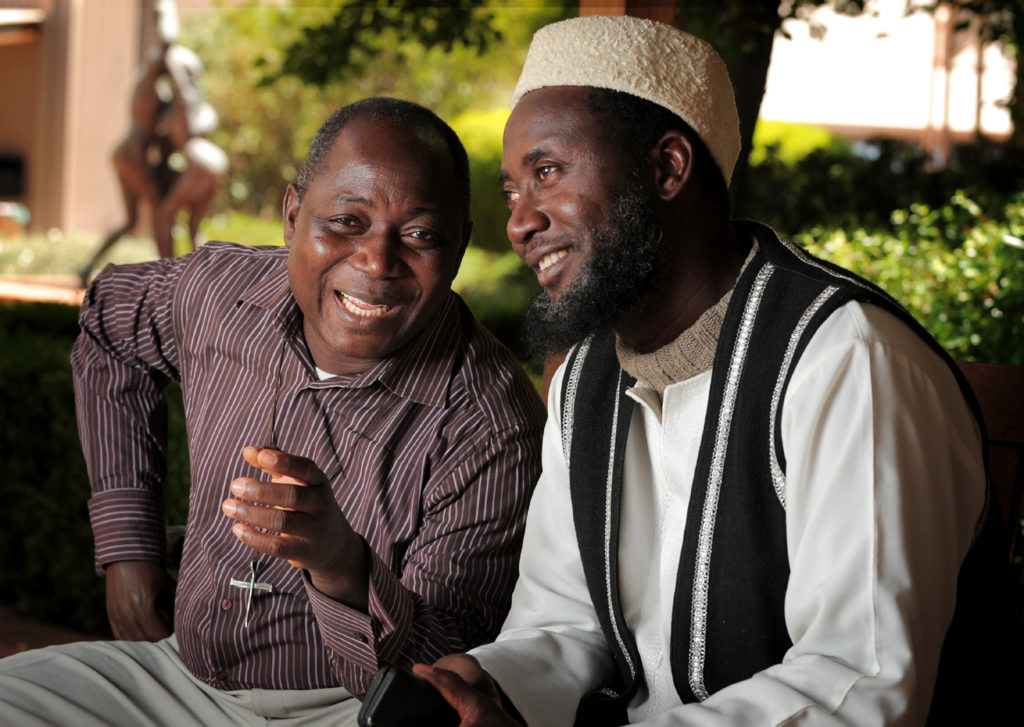
Unknown to many outside of the region, Egypt’s de facto police state exercises tight control over the people who are given access to its citizens. With this in mind, Tanenbaum was delighted when two of our Peacemakers from Nigeria, Pastor James Wuye and Imam Ashafa of the Interfaith Mediation Centre, were invited to train Egyptians on Muslim-Christian relations. Better yet, they’ve been invited back to deliver a post-election training!
The two religious leaders led a series of workshops in Alexandria and Cairo from June 13th to 16th. Their workshops promoted interfaith understanding, showed community leaders how to recognize indicators of conflict, and shared ways to mitigate violence in its earliest stages.
The Imam and the Pastor were brought to Egypt by the Center for Arab-West Understanding in response to rising threats of strife between Muslims and Christians. Following the overthrow of former Egyptian President Hosni Mubarak, religious extremists have used the resulting instability to inflame conflict between Christians and Muslims, resulting most notably in several high profile church burnings in Imbaba.
Participants in the workshops noted the obvious differences between the situation in Nigeria and Egypt, but were inspired by the deep friendship between Imam Ashafa and Pastor James. Through the training, participants learned how to implement an underutilized, but highly effective strategy for reducing tensions. They are going to build a local network and knowledge base, hopefully helping community leaders anticipate and resist rising sectarian conflict.
Today, Egypt is at the heart of the world’s most unstable regions. And two Tanenbaum Peacemakers are there – building grassroots-level change. These same men are also affecting change in Nigeria, another unstable region that continues to experience violence on the basis of religion.
In the weeks before this spring’s Nigerian elections, Tanenbaum sent a delegation of Peacemakers (Friar Ivo Markovic, a Franciscan Catholic from Bosnia, Yehezkel Landau, a Jewish Israeli-American, and Azhar Hussain, a Pakistani-American Muslim) to assist Imam Ashafa and Pastor James in reducing anticipated violence in the run-up to the contentious presidential elections. In a week of seminars, media appearances, and meetings with key government and religious leaders, the Peacemakers acted, and people responded. Their collaboration was so effective that one of Nigeria’s most prestigious peace organizations offered (for the first time) to support the Imam and the Pastor with desperately needed resources and training space.
In related exciting news, four of the five Peacemakers who comprised the Nigerian Delegation have confirmed attendance at A Rendezvous @ The Rubin on August 9th. Join us for the rare opportunity to meet these real life heroes and an unforgettable evening of mingling, global music, exotic food, and gallery tours at the beautiful Rubin Museum of Art in New York City.
And in case you’d like to learn more about the Nigeria Delegation, you can find Tanenbaum’s recently released report on the day by day adventures of the five companions. The Nigeria Report is interesting – both as a story and because it documents new and effective interventions in the field of conflict resolution. It was presented at The Second Emory Conference on Religion, Conflict, and Peacebuilding on June 19th and will be presented this fall at the American Academy of Religions Annual Meeting.
*Our thanks to Dr. Christopher Taylor, Professor of Religious Studies and Chair of the Department of Religious Studies in Drew’s College of Liberal Arts, as well as the Director of the Center on Religion, Conflict, & Culture for his contributions.